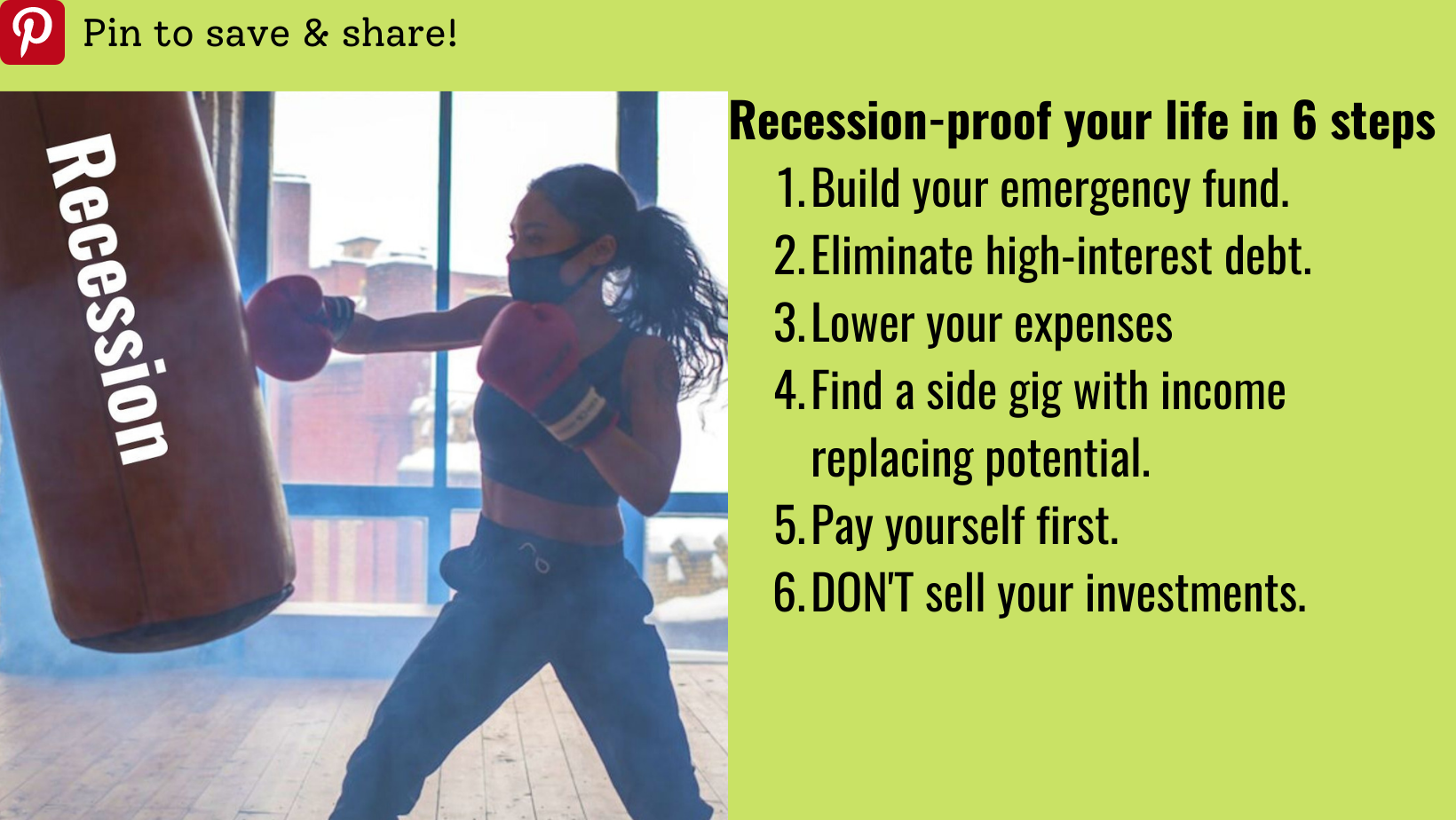How to recession-proof your life in 6 steps

Recessions are a natural part of our economy. They are generally unpleasant but if you’re prepared, you can ride it out. However, if you’re not ready, you can REALLY feel the pain. So it is essential to establish habits now to recession-proof your life to ride out the current one and the ones to come.
What is a recession?
A recession is defined as the “period of temporary economic decline during which trade and industrial activity are reduced, generally identified by a fall in GDP [gross domestic product] in two successive quarters”. So basically negative economic growth for two quarters or six months.
What happens during a recession?
- Unemployment rises
- Less spending
- Government debt increases
- Assets lose value
- Interest rates drop
- Difficulty finding jobs
Basically, recessions make getting or maintaining a job harder and make certain expenses increase.
How long do recessions last?
Most last 8-18 months. So while it can be a rough ride, they are temporary. Preparing for times of economic downturn should be part of your financial plan.
How to Recession-Proof Your Life

1. Have an emergency fund
Ramping up your savings will provide you with a cushion. This is especially important if there’s a possibility that your job decreases your hours or lays you off. If you do lose your job, an emergency fund will allow you to cover your bills while you search for another. To determine how much of an emergency fund you’ll need, you’ll need to determine how much your necessities cost and multiply that by how many months it would take you to replace your job. Most recommend at least a 3-month emergency fund, others as much as one year. This is the personal part of personal finance. Determine what works for you and your family.
2. Get rid of variable high-interest debt
What is high-interest debt? According to Tally, it’s debt that is greater than 6-8% interest. You’ll find that most “good debt”, like mortgages or student loans, tend to be about that range or lower. Credit cards, shopping cards, etc tend to be 16% or above. During recessions, these interest rates can increase even more!
Those interest rates can pile on quickly so create a debt repayment plan to get rid of that high-interest debt.
READ MORE: 4 Steps to Being Debt Free
3. Lower your expenses
Lowering your expenses is a great way to recession-proof your life. This creates an almost instant gap between your income and your spending. So think about which expenses in your life you can decrease or completely eliminate. The less your life costs, the less stressful your financial picture will be.
You can negotiate bills or lower necessary expenses with a little creativity and ingenuity.
READ MORE: How To Save More Money on Your Electric Bill
READ MORE: Save Money on Your Cell Phone Bill
READ MORE: How to Save Way More Money on Car Insurance
READ MORE: How To Save Money When Shopping
READ MORE: Four Compelling Reasons to Cancel Some of Your Subscriptions
READ MORE: Nix Fees & Never Get Charged By The Bank Again!
4. Find a side gig with income replacing potential
Increasing your income is one of the most efficient ways to recession-proof your money. There are a few reasons why this is a good idea.
- If you start now, you don’t have to deal with the learning curve when you need the money the most.
- You can feel reassured that you can provide for your family regardless of the circumstances you find yourself in.
If your job decreases your hours, you can supplement that missing income with your established side hustle.
If you lose your job, you can use this side hustle to hold you over until you find another job in your field. Or you can make your side hustle your main hustle. =
READ MORE: I Did Uber Eats for a Week – Learn How to Best Use It to Actually Make Money
5. Pay yourself first
When budgeting, yes BUDGETING, you give each dollar a purpose. If none of those dollars are purposed for you, that’s a problem. Part of your money plan should be to save for the things you need and want. This will give you the breathing room you need so you don’t feel crushed by the current economy.
READ MORE: How many bank accounts could you possibly need?!
READ MORE: How to Save Money and See Results!
6. Don’t sell your investments
During a recession, two things may occur that make you want to sell.
- You find yourself needing the cash.
- You see the market drop and you panic sell.
Do yourself a favor and don’t do it! There are very few circumstances where you would have no choice but to sell your investments. However, if you have your emergency fund, you would not likely need to dip into your investments. If you sell during a market drop, you would lock in your losses. Who wants that?
If you haven’t started to invest yet, now is a great time to get started. Check out THIS POST introducing you to Stash, one of the best investing platforms for beginners.
So the six steps to recession-proof your life are:
- Have an emergency fund.
- Get rid of variable high-interest debt.
- Lower your expenses.
- Find a side gig with income replacement potential.
- Pay yourself first.
- Don’t sell your investments.
Which of these steps are you going to take next?
